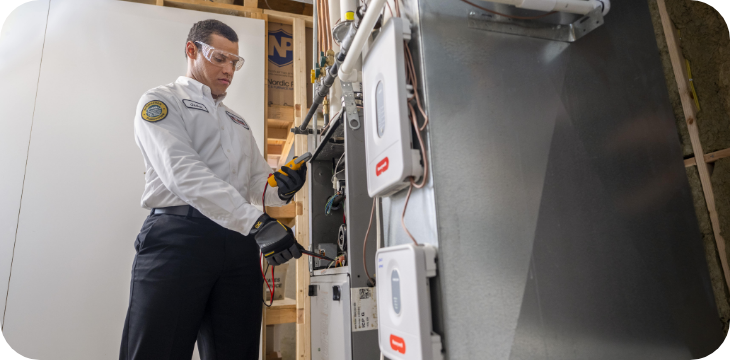Upgrade Your System Today with DMAKS HVAC Professional Help.
Upgrade Your System Today with DMAKS HVAC Professional Help.
Blog Article
Energy-Efficient Heating And Cooling Equipments to Save Money On Energy Costs
As power costs continue to climb, the significance of energy-efficient HVAC systems comes to be significantly obvious. These systems not only guarantee substantial financial savings on energy bills yet also add to a more sustainable future by decreasing energy intake.
Benefits of Energy-Efficient A/c Solutions
Energy-efficient heating and cooling systems supply various benefits that extend past mere expense financial savings. One considerable advantage is the decreased ecological effect. By consuming much less energy, these systems add to lower greenhouse gas emissions, helping to deal with climate change and promote sustainability. This straightens with increasing social demands for green techniques in domestic and industrial setups.
In addition, energy-efficient heating and cooling systems commonly give boosted convenience degrees. A number of these systems feature advanced technology that enables better temperature control and improved air quality (DMAKS HVAC). This results in a healthier indoor environment, which is specifically important for people with allergic reactions or respiratory system concerns
Furthermore, investing in energy-efficient heating and cooling systems can improve home value. As more consumers focus on energy efficiency, homes and buildings geared up with these systems may bring in greater bids in the property market.
Kinds Of Energy-Efficient HVAC Options
Just how can home owners and businesses pick the most ideal energy-efficient cooling and heating options for their needs? The marketplace provides a variety of energy-efficient cooling and heating systems, each developed to boost comfort while decreasing power consumption.
One alternative is the variable cooling agent circulation (VRF) system, which efficiently regulates the temperature in multiple areas within a building. This system adjusts its refrigerant circulation to match the wanted temperature level, causing significant power savings.
An additional preferred choice is geothermal warmth pumps, which use the planet's stable temperature level to heat and cool spaces. By moving warmth to and from the ground, these systems demonstrate remarkable effectiveness, especially in moderate environments.
In addition, ductless mini-split systems offer an energy-efficient option for homes lacking ductwork. These systems permit for zone-specific home heating and cooling, minimizing power waste in vacant areas.
Lastly, high-efficiency furnaces and a/c unit, with innovative SEER and AFUE rankings, offer reliable climate control while eating much less power than standard designs. By examining these options, homeowners and companies can select a cooling and heating system tailored to their certain demands and energy performance objectives.
Trick Functions to Think About

Following, investigate the kind of compressor used in the system. DMAKS HVAC. Variable-speed compressors can readjust their output to match the home heating or cooling need, causing improved convenience and power cost savings contrasted to single-speed designs. In addition, look for systems have a peek at this site equipped with wise Homepage thermostats that provide programmable settings and remote accessibility, enabling far better control over power usage
An additional essential function is the system's air purification capacity. High-efficiency filters can boost interior air top quality and decrease power intake by ensuring the system operates successfully. Additionally, think about the type of refrigerant used; modern systems often employ environment-friendly refrigerants that have a lower environmental influence.
Finally, make sure that the system works with zoning technology, which permits tailored temperature control in different locations of your home, improving comfort while minimizing power use.
Tips for Picking the Right System


Following, think about energy efficiency ratings, specifically the Seasonal Power Performance Proportion (SEER) for cooling systems and the Yearly Fuel Usage Efficiency (AFUE) for home heating systems. Greater scores indicate better performance, which can result in significant savings on energy expenses over time.
In addition, evaluate the kind of cooling and heating system that finest suits your way of living and budget plan. Options include air conditioning, ductless mini-splits, and heatpump, each with its own set of benefits and disadvantages.
Don't ignore the value of correct installation and sizing; an incorrectly sized system can cause inefficiencies and increased wear. Finally, speak with a specialist a/c contractor to get expert suggestions customized to your home's distinct needs. This comprehensive method will certainly ensure that you choose an energy-efficient cooling and heating system that meets your demands and budget successfully.
Upkeep for Optimal Efficiency
When the appropriate cooling and heating system is in place, continuous upkeep comes to be essential to ensuring optimal effectiveness and durability. A well-maintained system runs better, leading to lower power More Info consumption and decreased utility expenses. Routine evaluations and tune-ups must be set up at the very least two times a year-- once prior to the air conditioning period and as soon as prior to the home heating season.

Homeowners must additionally be cautious about monitoring their a/c system's efficiency. Uncommon sounds, changing temperature levels, or enhanced power bills can indicate underlying problems that call for immediate interest. By resolving these concerns without delay, home owners can protect against expensive fixings and prolong the lifespan of their systems.
Spending in an upkeep strategy with a qualified service technician not only enhances effectiveness yet also offers assurance, recognizing that the system is operating at its finest. DMAKS HVAC. Normal upkeep is therefore vital for maintaining energy efficiency and lowering overall operational costs
Final Thought
To conclude, energy-efficient heating and cooling systems provide a practical service for minimizing energy costs while enhancing comfort and air quality. By incorporating advanced innovations and options such as geothermal heatpump and ductless mini-splits, residential or commercial property owners can achieve significant energy financial savings and add to ecological sustainability. Mindful factor to consider of system attributes and continuous maintenance further guarantees ideal performance, making energy-efficient systems a prudent investment for both financial and ecological benefits.
Report this page